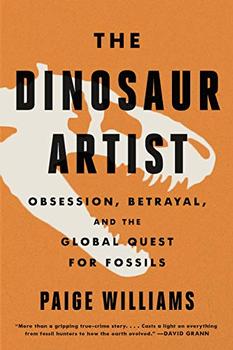Summary | Excerpt | Reviews | Beyond the Book | Readalikes | Genres & Themes | Author Bio

Obsession, Betrayal, and the Quest for Earth's Ultimate Trophy
by Paige Williams
This, minus the dishwasher, has been going on for millennia. As humans collected the remains of one life form after another, naturalists built an inventory of the planet's former inhabitants. That inventory today is known as the fossil record, a compendium that is postulated, debated, and revised by paleontologists through peer-reviewed research, providing a portrait of lost time. Without fossils, an understanding of the earth's formation and history would not be possible. Without fossils, we would not know Earth's age: 4.6 billion years. We would not know when certain creatures lived, when they died out, how they looked, what they ate. Without fossils, natural history museums might not exist. The geologic time scale would not exist because knowledge of the earth's stratigraphy, or layers, would not exist. We would not know that the continents were not always where they are now, and that Earth's shifting, sliding plates rearrange land and sea. We would not know the climate has warmed and cooled and is changing still. We would not know that five mass extinctions have occurred and that we're in the sixth one now. We would have no idea of any ice age. Without fossils, we would not know that birds evolved from dinosaurs; or that Earth was already billions of years old before flowering plants appeared; or that sea creatures transitioned to life on land and primates to creatures that crafted tools, grew crops, and started wars. We would not know that rhinos once lived in Florida and sharks swam around the Midwest. We would not know that stegosaurs lived millions of years before T. rex, an animal that, in geologic time, is closer to human beings than to the first of its kind.
The earth's layers are finite: each has a beginning, middle, and end, like tiramisu, wherein ladyfingers meet mascarpone. The most recent layers hold mammals, fishes, and birds not terribly different from those that are alive today, but the further back one goes, the more fantastical some of the creatures. The fossil record shows that life began with microscopic organisms and flourished to the unthinkably gargantuan animals of the Mesozoic, a 160-million-year era that ended some 65.5 million years ago. In the Age of Reptiles, dinosaurs crashed through forests, terrorized prey, zipped around like overstimulated roadrunners, and lub-lubbed along, looking for something leafy to eat and trying to avoid being eaten. Their remains continually surface as weather, erosion, and civilization peel the planet layer by layer.
Fossils are the single most important clue to understanding how the planet evolved, yet attitudes toward their protection vary from continent to continent, and from state to state. The United States, a particularly fossil-rich country, is unusual: policymakers have had no desire to mess with private-property laws, so it remains true that if you find fossils on your own land, or on private property where you have permission to collect, they are yours to keep or sell or ignore or destroy, no matter what or how scientifically important the specimen may be.
Three primary groups of people seek and covet fossils: paleontologists, collectors, and commercial hunters. Paleontologists hone their expertise through undergraduate, graduate, and doctoral courses that immerse them in geology, evolutionary biology, zoology, computer science, statistical analysis, ecology, chemistry, climatology, and other maths and sciences. They pursue specialties in areas like paleobotany (fossil plants), invertebrate paleontology (animals without backbones, like mussels and corals), micropaleontology (requires a microscope), and vertebrates (backbones). Paleontologists tend to work in academia and museums, publishing their research in peer-reviewed scientific journals such as Geology and the Journal of Vertebrate Paleontology. Scientists believe it crucial to protect certain types of fossils by banning their trade. Commercial dealers, on the other hand, hunt, sell, and buy fossils, at trade shows, in privately owned natural history shops, and online. It is entirely legal to sell some fossils and illegal to sell others, and it's often been hard for consumers to know the difference. Many dealers grew up hunting fossils and might have studied natural sciences in college if they'd had the chance. Most are self-taught. Many are libertarians and believe they should be able to do whatever they want as long as they're not hurting anybody. Many loathe government regulations and feel entitled to fossils, taking the view that the earth belongs to everyone. Most fossil dealers feel that by collecting and selling fossils they're rescuing materials that otherwise would erode, and that their industry provides a valuable service by supplying classrooms and collectors and, in some cases, museums, and by encouraging widespread interest in the natural world. Commercial hunters take pride in selling to museums, but they also court wealthy, private collectors. Successful dealers can make a living in fossils, though it is rarely a get-rich game, since so much of the profit folds back into the hunt. Overseas museums, especially those proliferating in China, Japan, and the Middle East, have no problem buying commercially while public museums in the United States—those supported by tax dollars—tend not to shop the market, preferring to collect their own materials under scientific conditions. While both a commercial hunter and a paleontologist may also be a collector, no reputable paleontologist is a dealer: paleontologists do not sell fossils for much the same reason hematologists don't peddle vials of blood. Fossils are the data, it's been said.
Excerpted from The Dinosaur Artist by Paige Williams. Copyright © 2018 by Paige Williams. Excerpted by permission of Hachette Books. All rights reserved. No part of this excerpt may be reproduced or reprinted without permission in writing from the publisher.
Your guide toexceptional books
BookBrowse seeks out and recommends the best in contemporary fiction and nonfiction—books that not only engage and entertain but also deepen our understanding of ourselves and the world around us.